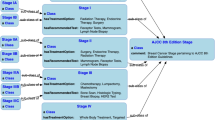Abstract
Choosing an appropriate support for Clinical Decision Support Systems is a complicated task, and dependent on the domain in which the system will intervene. The development of wide solutions, which are transversal to different clinical specialties, is impaired by the existence of complex decision moments that reflect the uncertainty and imprecision that are often present in these processes. The need for solutions that combine the relational nature of declarative knowledge with other models, capable of handling that uncertainty, is a necessity that current systems may be faced with. Following this line of thought, this work introduces an ontology for the representation of Clinical Practice Guidelines, with a case-study regarding colorectal cancer. It also presents two models, one based on Bayesian Networks, and another one on Artificial Neural Networks, for colorectal cancer prognosis. The objective is to observe how well these two ways of obtaining and representing knowledge are complementary, and how the machine learning models perform, attending to the available information.
Access this chapter
Tax calculation will be finalised at checkout
Purchases are for personal use only
Preview
Unable to display preview. Download preview PDF.
Similar content being viewed by others
References
Kaushal, R., Shojania, K.G., Bates, D.W.: Effects of computerized physician order entry and clinical decision support systems on medication safety: a systematic review. Archives of Internal Medicine 163(12), 1409–1416 (2003)
Musen, M.A., Shahar, Y., Shortliffe, E.H.: Clinical decision-support systems. Biomedical Informatics, 698–736 (2006)
Rosenbrand, K., Croonenborg, J., Wittenberg, J.: Guideline Development. In: Teije, A., Miksch, S., Lucas, P. (eds.) Computer-based Medical Guidelines and Protocols: A Primer and Current Trends, pp. 3–22 (2008)
Ferlay, J., Autier, P., Boniol, M., Heanue, M., Colombet, M., Boyle, P.: Estimates of the cancer incidence and mortality in Europe in 2006. Annals of Oncology: Official Journal of the European Society for Medical Oncology 18(3), 581–592 (2007)
McGuinness, D.L., Van Harmelen, F.: OWL Web Ontology Language Overview. W3C Recommendation 10, 1–19 (2004)
Isern, D., Moreno, A.: Computer-based execution of clinical guidelines: a review. International Journal of Medical Informatics 77(12), 787–808 (2008)
Oliveira, T., Novais, P., Neves, J.: Development and implementation of clinical guidelines: An artificial intelligence perspective. Artificial Intelligence Review (2013), doi: 10.1007/s10462-013-9402-2
Ohno-Machado, L., et al.: The guideline interchange format. Journal of the American Medical Informatics Association 5(4), 357 (1998)
Vier, E., Fox, J., Johns, N., Lyons, C., Rahmanzadeh, A., Wilson, P.: PROforma: systems. Computer Methods and Programs in Biomedicine 2607(97) (1997)
Tu, S., et al.: The SAGE Guideline Model: achievements and overview. Journal of the American Medical Informatics Association 14(5), 589–598 (2007)
Straszecka, E.: Combining uncertainty and imprecision in models of medical diagnosis. Information Sciences 176, 3026–3059 (2006)
Horzic, M., Kopljar, M., Cupurdija, K., Bielen, D.V., Vergles, D., Lackovic, Z.: Comparison of P-POSSUM and Cr-POSSUM scores in patients undergoing colorectal cancer resection. Archives of Surgery 142(11), 1043–1048 (2007)
Senagore, A.J., Warmuth, A.J., Delaney, C.P., Tekkis, P.P., Fazio, V.W.: POSSUM, p-POSSUM, and Cr-POSSUM: implementation issues in a United States health care system for prediction of outcome for colon cancer resection. Diseases of the Colon and Rectum 47(9), 1435–1441 (2004)
Witten, I.H., Frank, E., Hall, M.: Data Mining: Practical machine learning tools and techniques. Morgan Kaufmann (2011)
Cohen, J.: A coefficient of agreement for nominal scales. Educational and Psychological Measurement 20(1), 37–46 (1960)
Lantz, C.A., Nebenzahl, E.: Behavior and interpretation of the κ statistic: Resolution of the two paradoxes. Journal of Clinical Epidemiology 49(4), 431–434 (1996)
Willmott, C.J., Matsuura, K.: Advantages of the mean absolute error (MAE) over the root mean square error (RMSE) in assessing average model performance. Climate Research 30(1), 79–82 (2005)
Winawer, S., Fletcher, R., Rex, D., Bond, J., Burt, R., Ferrucci, J., Ganiats, T., Levin, T., Woolf, S., Johnson, D., Kirk, L., Litin, S., Simmang, C.: Colorectal cancer screening and surveillance: Clinical guidelines and rationale-Update based on new evidence. Gastroenterology 124(2), 544–560 (2003)
Chawla, N.V.: Data mining for imbalanced datasets: An overview. In: Data Mining and Knowledge Discovery Handbook, pp. 853–867. Springer (2005)
Author information
Authors and Affiliations
Editor information
Editors and Affiliations
Rights and permissions
Copyright information
© 2013 Springer-Verlag Berlin Heidelberg
About this paper
Cite this paper
Oliveira, T., Neves, J., Barbosa, E., Novais, P. (2013). Clinical Careflows Aided by Uncertainty Representation Models. In: Pan, JS., Polycarpou, M.M., Woźniak, M., de Carvalho, A.C.P.L.F., Quintián, H., Corchado, E. (eds) Hybrid Artificial Intelligent Systems. HAIS 2013. Lecture Notes in Computer Science(), vol 8073. Springer, Berlin, Heidelberg. https://doi.org/10.1007/978-3-642-40846-5_8
Download citation
DOI: https://doi.org/10.1007/978-3-642-40846-5_8
Publisher Name: Springer, Berlin, Heidelberg
Print ISBN: 978-3-642-40845-8
Online ISBN: 978-3-642-40846-5
eBook Packages: Computer ScienceComputer Science (R0)




